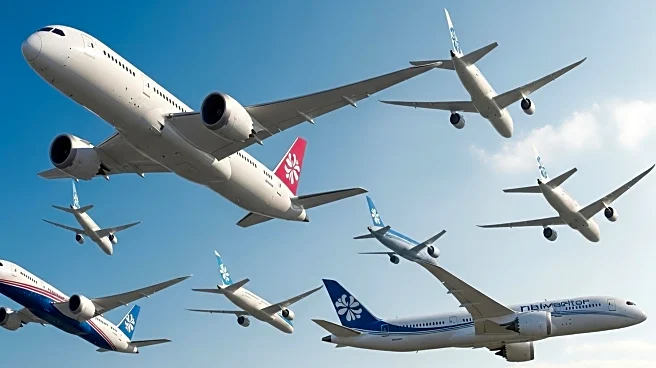What's Happening?
Uzbekistan Airways has placed a significant order for 14 Boeing 787-9 aircraft, with options for an additional eight, marking the largest single purchase in the airline's history. This strategic move is part of the airline's fleet modernization efforts and was announced during the United Nations General Assembly. The order aims to update the airline's widebody fleet and support its long-haul operations, which currently include routes to Europe, Asia, and the United States, such as a direct service to New York City. The introduction of the 787-9 is expected to enhance the airline's capacity and range, facilitating the expansion of international routes.
Why It's Important?
This order is significant for both Uzbekistan Airways and Boeing. For the airline, acquiring the Boeing 787-9s will enhance its operational capabilities, allowing it to expand its international reach and improve service efficiency. The aircraft's fuel efficiency and operational flexibility are expected to support the airline's growth strategy by enabling new routes and serving additional destinations. For Boeing, this order represents a substantial business opportunity and strengthens its presence in Central Asia. The deal also includes a Memorandum of Cooperation between Boeing and the Uzbekistan Ministry of Transport to further develop the country's aviation sector, potentially positioning Uzbekistan as a key aviation hub in the region.
What's Next?
The acquisition of the Boeing 787-9s will likely lead to an expansion of Uzbekistan Airways' international routes, particularly to the United States and other long-haul destinations. The airline's enhanced fleet capabilities may attract more passengers and increase its competitiveness in the global aviation market. Additionally, the cooperation agreement with Boeing could lead to further investments and developments in Uzbekistan's aviation infrastructure, supporting the country's ambitions to become a central aviation hub in Central Asia.
Beyond the Headlines
The order and subsequent developments could have broader implications for the aviation industry in Central Asia. By modernizing its fleet and expanding its route network, Uzbekistan Airways may set a precedent for other regional carriers to follow suit, potentially leading to increased competition and improved air travel options in the region. The collaboration with Boeing might also encourage other international aerospace companies to explore opportunities in Uzbekistan, fostering economic growth and technological advancement in the country's aviation sector.











